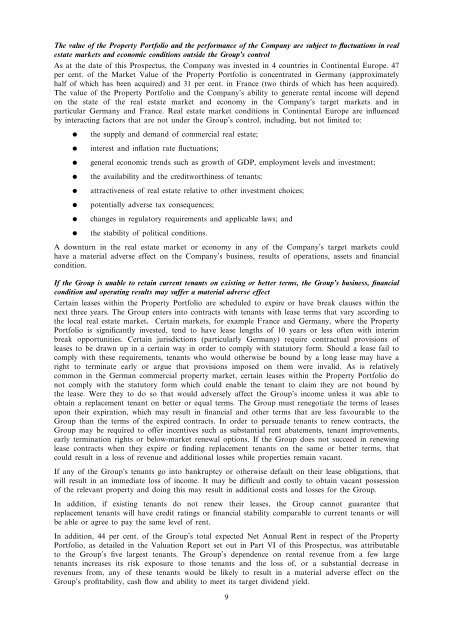You also want an ePaper? Increase the reach of your titles
YUMPU automatically turns print PDFs into web optimized ePapers that Google loves.
The value of the Property Portfolio and the performance of the Company are subject to fluctuations in real<br />
estate markets and economic conditions outside the Group’s control<br />
As at the date of this Prospectus, the Company was invested in 4 countries in Continental Europe. 47<br />
per cent. of the Market Value of the Property Portfolio is concentrated in Germany (approximately<br />
half of which has been acquired) and 31 per cent. in France (two thirds of which has been acquired).<br />
The value of the Property Portfolio and the Company’s ability to generate rental income will depend<br />
on the state of the real estate market and economy in the Company’s target markets and in<br />
particular Germany and France. Real estate market conditions in Continental Europe are influenced<br />
by interacting factors that are not under the Group’s control, including, but not limited to:<br />
* the supply and demand of commercial real estate;<br />
* interest and inflation rate fluctuations;<br />
* general economic trends such as growth of GDP, employment levels and investment;<br />
* the availability and the creditworthiness of tenants;<br />
* attractiveness of real estate relative to other investment choices;<br />
* potentially adverse tax consequences;<br />
* changes in regulatory requirements and applicable laws; and<br />
* the stability of political conditions.<br />
A downturn in the real estate market or economy in any of the Company’s target markets could<br />
have a material adverse effect on the Company’s business, results of operations, assets and financial<br />
condition.<br />
If the Group is unable to retain current tenants on existing or better terms, the Group’s business, financial<br />
condition and operating results may suffer a material adverse effect<br />
Certain leases within the Property Portfolio are scheduled to expire or have break clauses within the<br />
next three years. The Group enters into contracts with tenants with lease terms that vary according to<br />
the local real estate market. Certain markets, for example France and Germany, where the Property<br />
Portfolio is significantly invested, tend to have lease lengths of 10 years or less often with interim<br />
break opportunities. Certain jurisdictions (particularly Germany) require contractual provisions of<br />
leases to be drawn up in a certain way in order to comply with statutory form. Should a lease fail to<br />
comply with these requirements, tenants who would otherwise be bound by a long lease may have a<br />
right to terminate early or argue that provisions imposed on them were invalid. As is relatively<br />
common in the German commercial property market, certain leases within the Property Portfolio do<br />
not comply with the statutory form which could enable the tenant to claim they are not bound by<br />
the lease. Were they to do so that would adversely affect the Group’s income unless it was able to<br />
obtain a replacement tenant on better or equal terms. The Group must renegotiate the terms of leases<br />
upon their expiration, which may result in financial and other terms that are less favourable to the<br />
Group than the terms of the expired contracts. In order to persuade tenants to renew contracts, the<br />
Group may be required to offer incentives such as substantial rent abatements, tenant improvements,<br />
early termination rights or below-market renewal options. If the Group does not succeed in renewing<br />
lease contracts when they expire or finding replacement tenants on the same or better terms, that<br />
could result in a loss of revenue and additional losses while properties remain vacant.<br />
If any of the Group’s tenants go into bankruptcy or otherwise default on their lease obligations, that<br />
will result in an immediate loss of income. It may be difficult and costly to obtain vacant possession<br />
of the relevant property and doing this may result in additional costs and losses for the Group.<br />
In addition, if existing tenants do not renew their leases, the Group cannot guarantee that<br />
replacement tenants will have credit ratings or financial stability comparable to current tenants or will<br />
be able or agree to pay the same level of rent.<br />
In addition, 44 per cent. of the Group’s total expected Net Annual Rent in respect of the Property<br />
Portfolio, as detailed in the Valuation Report set out in Part VI of this Prospectus, was attributable<br />
to the Group’s five largest tenants. The Group’s dependence on rental revenue from a few large<br />
tenants increases its risk exposure to those tenants and the loss of, or a substantial decrease in<br />
revenues from, any of these tenants would be likely to result in a material adverse effect on the<br />
Group’s profitability, cash flow and ability to meet its target dividend yield.<br />
9


